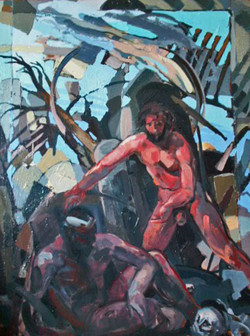 |
| Edward Knippers, Jesus & the Demonaic |
I've thought about the evil presence behind a mob--the group drive toward evil. It makes sense to me that there could be this type of multiple person evil within a person. Mobs strike me as harbors of evil. Courson also thinks there is a connection or lesson in the self-destructive choice of the demons to run the pigs over a cliff and connects this to the spirit of despair associated with suicide.
"Such behavior shows that demon possession is not mere sickness or insanity but a desperate satanic attempt to distort and destroy God’s image in man" (cf. TDNT, s.v. “daimōn,” 2:18-19). -BKC on the demonic man in the caves
All BKC:
"The command to the demon (Mar_5:6-10)
The brief statement of Jesus’ encounter with the demoniac (Mar_5:2) is now related in more detail. Three things indicate that the demon possessing the man was fully aware of Jesus’ divine origin and superior power: he knelt before Him (in homage, not worship); he used Jesus’ divine name in an attempt to gain control over Him (cf. Mar_1:24); and he brazenly appealed to Jesus not to punish him. The words, Most High God, were used in the Old Testament, often by Gentiles, to refer to the superiority of the true God of Israel over all man-made gods (cf. Gen_14:18-24; Num_24:16; Isa_14:14; Dan_3:26; Dan_4:2; cf. comments on Mar_1:23-24).The plea, Swear to God, was used in exorcisms and should be rendered, “I implore you by (I appeal to) God.” The demon did not want Jesus to torture him by sending him to his final punishment then (cf. Mar_1:24; Mat_8:29; Luk_8:31)."

Interesting that the commentaries seem to suggest that the man was not interested in being healed, but in manipulating Christ. Or is this the demons speaking and not the man? The demons want to be left alone. They intuitively recognize Christ on some level, recognized He was the son of God.
5:6-13 When the demoniac saw Jesus, he first acted respectfully, then complained bitterly. “How true and terrible a picture is this—a man bowed in adoration, petition and faith, and yet hating, defiant and fearing; a double personality, longing for liberty and yet clinging to passion” (Scripture Union Notes). -BBC
Reminds me of our discussion in group yesterday and the materials we are reading---God requires a response, and a genuine one, not one just stemming from self-interest or self-preservation.
“Countless multitudes still wish Christ far from them for fear His fellowship may occasion some social or financial or personal loss. Seeking to save their possessions, they lose their souls” (Selected).-BBC
I forgot that the demon-possessed man wished to accompany Jesus.
"A legion is a Roman military term used to denote a unit of six thousand soldiers, so it is possible that there were thousands of demons within this man." -Courson The message traslates "legion" as a "rioting mob."
Darby: "Now, when Jesus departs, he who had personally experienced the mighty effects of His love would have liked to be with Him; but he was to go home and bear testimony to those around him of all that Jesus had done. He was to serve in the absence of Jesus. In all these narratives we see the work and the devotedness of the Servant, but at the same time the divine power of Jesus manifested in this service."
Me too...I can relate to this man. Having found Jesus, who wants to serve apart from Him? Yet this is our calling...serving apart from His physical presence---yet He has not abandoned us---we have His spirit and are not orphans. And He is coming back when we will be by his side forever.
Matthew Henry's take on this:
" Christ would not suffer him to go with him, lest it should savour of ostentation, and to let him know that he could both protect and instruct him at a distance. And besides, he had other work for him to do; he must go home to his friends, and tell them what great things the Lord had done for him, the Lord Jesus had done; that Christ might be honoured, and his neighbours and friends might be edified, and invited to believe in Christ. He must take particular notice rather of Christ's pity than of his power, for that is it which especially he glories in; he must tell them what compassion the Lord had had on him in his misery."
" Christ would not suffer him to go with him, lest it should savour of ostentation, and to let him know that he could both protect and instruct him at a distance. And besides, he had other work for him to do; he must go home to his friends, and tell them what great things the Lord had done for him, the Lord Jesus had done; that Christ might be honoured, and his neighbours and friends might be edified, and invited to believe in Christ. He must take particular notice rather of Christ's pity than of his power, for that is it which especially he glories in; he must tell them what compassion the Lord had had on him in his misery."

No comments:
Post a Comment